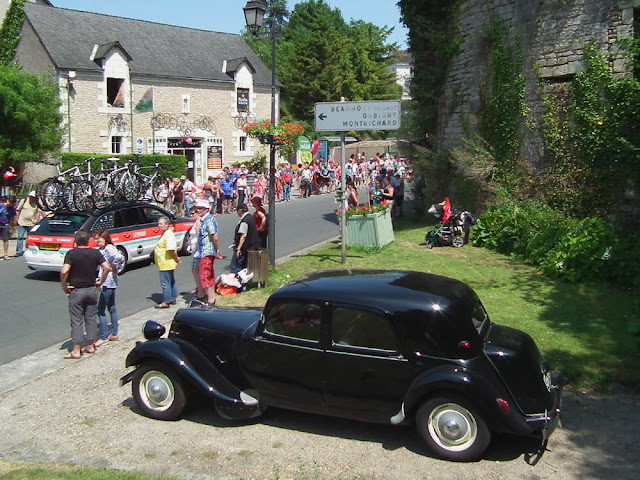Undoubtedly the most sophisticated of the classic Australian chocolate confectionaries, Cherry Ripes are covered in dark chocolate, with a cherry / coconut interior.
***********************************************************
***********************************************************
Tour de France: This year the famous cycle race spent two days in our area, overnighting in Tours on Thursday. Simon scoured the route to find the best place for us to go to watch the race. He chose Montrésor, and imagine our delight when we arrived and found the most perfect parking spot for Célestine in the shadow of the chateau ramparts. We invited Niall and Antoinette to come with us on a picnic as they hadn't 'done' the Tour before. Niall was sceptical, but by the end of the event, totally converted! Kath and Roger, who live across the 'border' in Vienne and write Our French Adventure, spotted us and came over to introduce themselves, which was really nice too. The weather was warm without being scorching, our vantage point in the village could not have been beaten for a comfortable view of the caravan and race, and we shared way too much delicious food in the company of good friends. We hope you spotted us on television!
************************************************************************
In Our Kitchen Yesterday: 2kg of sour cherries put to cherry syrup (1kg sugar, 2l water, boil until reduced to about half, leave overnight then strain). The remaining sour cherries sorted, destalked and frozen.
**********************************************************
Bees versus Honey Bees: Jeff Ollerton, Professor of Biodiversity in the Department of Environmental and Geographical Sciences at the University of Northampton, has posted on his blog about his frustration with regularly having to explain that the problems in the apiary industry are a different issue to the decline in wild bees, but the two things are regularly conflated by the media and the public. The issues with the domestic honey bee's health and mortality have to do with husbandry. The main issue affecting wild bees is loss of habitat, leading to lack of food and nesting places. Pesticides are a side issue, although should not be ignored. Honey bees are not particularly important for providing pollination services in the overall scheme of things, but wild bees and hover flies are.
Jeff concludes:
Honey bees are (like any other agricultural animal) a utilitarian species that provides us with a range of benefits...If honey bees become the central focus of ...[conservation] strategies (and funding), due to confusion in the minds of the public, MPs, policy makers, businesses, the media and other influential bodies, then wild pollinators would lose out.



3 comments:
Interesting. There's a "squeaky
wheel" situation over here because honey bees are an industry of
sorts. The hives are transported
on huge trucks to, say, California
to pollinate the almond crops.
The CCD has led to our believing
that ALL bees are dying. This
because of the great hue and cry
from those who make money from
their hives.
So...did Angus hear the buzz of
wild or honey bees?
Sheila: it would have been a mixture of honey bees, bumble bees, drone flies, other hover flies and other bees.
What a stylish way to take in a stage of the TdF. We are very envious on both counts.:o)
Post a Comment